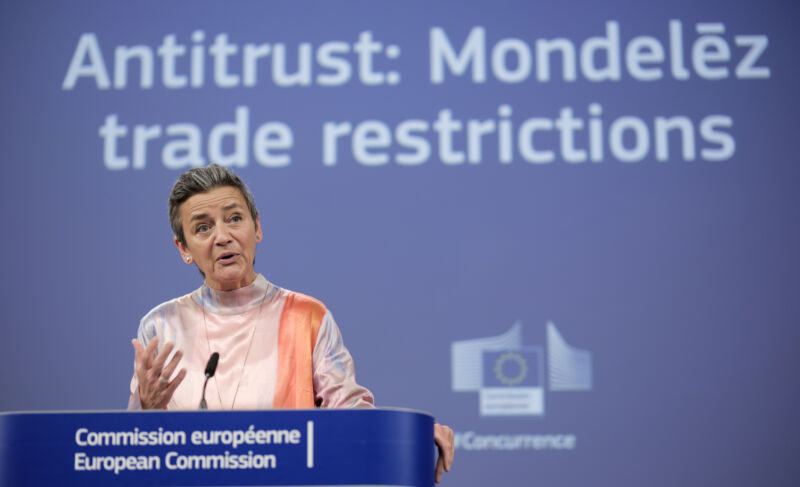still asking questions —
EU executive arm drops merger review into US tech companies’ alliance.

Enlarge / EU competition chief Margrethe Vestager said the bloc was looking into practices that could in effect lead to a company controlling a greater share of the AI market.
Brussels is preparing for an antitrust investigation into Microsoft’s $13 billion investment into OpenAI, after the European Union decided not to proceed with a merger review into the most powerful alliance in the artificial intelligence industry.
The European Commission, the EU’s executive arm, began to explore a review under merger control rules in January, but on Friday announced that it would not proceed due to a lack of evidence that Microsoft controls OpenAI.
However, the commission said it was now exploring the possibility of a traditional antitrust investigation into whether the tie-up between the world’s most valuable listed company and the best-funded AI start-up was harming competition in the fast-growing market.
The commission has also made inquiries about Google’s deal with Samsung to install a modified version of its Gemini AI system in the South Korean manufacturer’s smartphones, it revealed on Friday.
Margrethe Vestager, the bloc’s competition chief, said in a speech on Friday: “The key question was whether Microsoft had acquired control on a lasting basis over OpenAI. After a thorough review we concluded that such was not the case. So we are closing this chapter, but the story is not over.”
She said the EU had sent a new set of questions to understand whether “certain exclusivity clauses” in the agreement between Microsoft and OpenAI “could have a negative effect on competitors.” The move is seen as a key step toward a formal antitrust probe.
The bloc had already sent questions to Microsoft and other tech companies in March to determine whether market concentration in AI could potentially block new companies from entering the market, Vestager said.
Microsoft said: “We appreciate the European Commission’s thorough review and its conclusion that Microsoft’s investment and partnership with OpenAI does not give Microsoft control over the company.”
Brussels began examining Microsoft’s relationship with the ChatGPT maker after OpenAI’s board abruptly dismissed its chief executive Sam Altman in November 2023, only to be rehired a few days later. He briefly joined Microsoft as the head of a new AI research unit, highlighting the close relationship between the two companies.
Regulators in the US and UK are also scrutinizing the alliance. Microsoft is the biggest backer of OpenAI, although its investment of up to $13 billion, which was expanded in January 2023, does not involve acquiring conventional equity due to the startup’s unusual corporate structure. Microsoft has a minority interest in OpenAI’s commercial subsidiary, which is owned by a not-for-profit organization.
Antitrust investigations tend to last years, compared with a much shorter period for merger reviews, and they focus on conduct that could be undermining rivals. Companies that are eventually found to be breaking the law, for example by bundling products or blocking competitors from access to key technology, risk hefty fines and legal obligations to change their behavior.
Vestager said the EU was looking into practices that could in effect lead to a company controlling a greater share of the AI market. She pointed to a practice called “acqui-hires,” where a company buys another one mainly to get its talent. For example, Microsoft recently struck a deal to hire most of the top team from AI start-up Inflection, in which it had previously invested. Inflection remains an independent company, however, complicating any traditional merger investigation.
The EU’s competition chief said regulators were also looking into the way big tech companies may be preventing smaller AI models from reaching users.
“This is why we are also sending requests for information to better understand the effects of Google’s arrangement with Samsung to pre-install its small model ‘Gemini nano’ on certain Samsung devices,” said Vestager.
Jonathan Kanter, the top US antitrust enforcer, told the Financial Times earlier this month that he was also examining “monopoly choke points and the competitive landscape” in AI. The UK’s Competition and Markets Authority said in December that it had “decided to investigate” the Microsoft-OpenAI deal when it invited comments from customers and rivals.
© 2024 The Financial Times Ltd. All rights reserved. Please do not copy and paste FT articles and redistribute by email or post to the web.